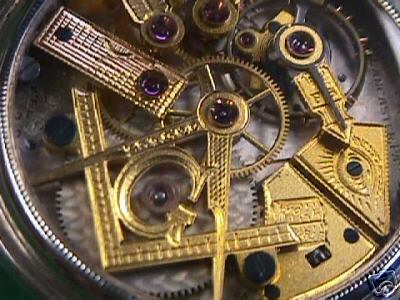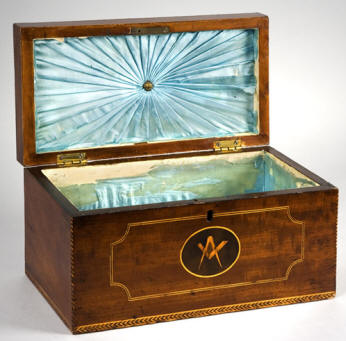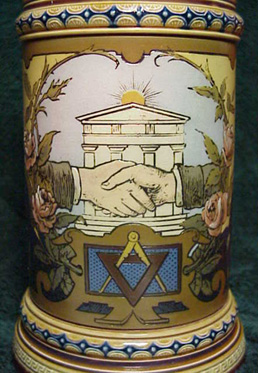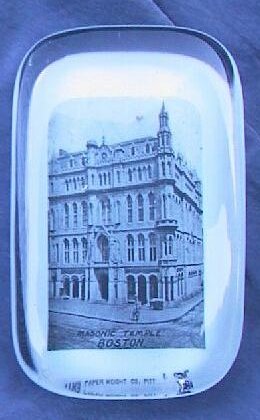For more information, see:
Related Topics:

 How
much is this worth?
How
much is this worth?
Every month, masonicinfo.com receives several inquiries often accompanied by digital photographs asking for guidance on the worth of some family treasure or trinket found at a lawn sale. With a few, there's a long provenance that is fascinating to read while with others it's "...something I found....".
Be it a Masonic apron, a beautifully framed membership certificate, a wonderfully engraved box, or a breast jewel, these items are usually gorgeous to view and give anyone involved in Freemasonry a few moments of contemplation on their history.
It's a matter of ethics
However, despite the temptation to hazard a guess, the fact is that yours truly is NOT a professional appraiser. Appraising ANYTHING takes a deep knowledge of the marketplace and despite the ease with which the folks on Antiques Roadshow seem to rattle off stories about many varied objects, the careful observer will note that those doing the speaking on particular objects are experts in that field, working daily in the auction market and following all of the sales and offers of similar items.
You don't see the Keno twins giving their opinion on the price of stamp collections nor do you see the mustachioed Noel Barrett waxing poetic on the grace of a porcelain jar. These folks are experts in THEIR respective fields (furniture and toys) - and it's what they do every day of the week. When they give appraisals, it's in their field of expertise. Further, if you listen carefully you'll hear them almost invariably say, "I've checked with my colleagues...." or "I've seen these go for...." They want to get it right - but with Masonic objects, there's a very small market and experts are nowhere to be found except in the broader context (books, jewelry, furniture, etc.) where they've likely seen Masonic items of that ilk.
What about Phoenix Masonry? They're a museum....
 Well,
NO, they aren't. They identify themselves as "An organization exhibiting Masonic
documents, lectures, and objects in a historical context." - but their
"exhibits" are online only and they appear to be owned by one person.
Well,
NO, they aren't. They identify themselves as "An organization exhibiting Masonic
documents, lectures, and objects in a historical context." - but their
"exhibits" are online only and they appear to be owned by one person.
The Phoenix Masonry website started not long after ours did and in the beginning they had all sorts of eye candy at a time when pictures of 'things Masonic' on the web were very scarce. They went about accumulating things that they'd show on their site, some apparently DONATED by kind-hearted Masons or their families. It can only be assumed they thought this was some kind of brick and mortar institution and that their heirlooms or finds would be kept in perpetuity. In fact, such donations are ENCOURAGED as is seen by the statement below.
"We hope that this museum becomes an inspiration to those who have visited and would like to "Thank" again the many Brethren and individuals who donated their time and artifacts to bring this project through to fruition. If you have an item that you would like to donate in your name or "In Memory" of another or a special Masonic item of interest that you might just want to share pictures of with others, please contact the curator at...." (Phoenix Masonry website accessed 31 August 2009. Link here)
Moreover, though, some of our correspondents would write for our opinion on prices, saying that they had received an appraisal from Phoenix Masonry that was well below what they thought the item was worth - accompanied by a suggestion from Phoenix Masonry suggesting that it be donated to them. That just didn't seem right in light of the fact that this was not a 'real' museum but simply an individual collecting Masonic artifacts and putting them on view on the web. We'd regularly write back suggesting a PROFESSIONAL appraisal before proceeding.
Certainly not everything
they've handled over the years had that taint. I know, for example, that they've
purchased some things in open bidding on e-Bay. In fact, the DeMoulin catalog
they have on their site today was something I was bidding on at the same time. I
knew they were the winners when it appeared on their site about three weeks
later!
However, as so many have learned the hard way, the web isn't always what it seems. The creator of the Phoenix Masonry website is not, in fact, a regular/recognized Freemason. For several years he was the Webmaster for the Masonic Library and Museum Association but membership in that organization is NOT predicated on Masonic membership. He is a member of a group that we consider 'fake Masonry' and would never be allowed to attend a meeting of the local Masonic lodge in your area. During late 2008 he began making several quite vocal disparaging comments about regular and recognized Freemasonry and then abruptly quit his MLMA membership with the threat of closing the Association's website. The organization acted quickly and a new site with a new domain name was created but his behavior further taints what the Phoenix Masonry website is doing.
Roadshow appraisers buy things though...
Not really. The appraiser is NOT buying the item for their own use, to keep at their house. They act as middle-men, putting items up for auction and then taking a percentage of the sale whether it's higher or lower than their appraisal. In fact, the program's website even has a page to help viewers understand what's happening. It's here but we've copied two paragraphs which are important to understand - both in relation to the Roadshow and ANY appraisal:
| Verbal approximations: The values given by the experts on
ANTIQUES ROADSHOW are considered "verbal approximations of value."
Technically, an "appraisal" is a legal document, generally for insurance
purposes, written by a qualified expert and paid for by the owner of the
item. An appraisal usually involves an extensive amount of research to
establish authenticity, provenance, composition, method of construction,
and other important attributes of a particular object.
Opinion of value: As with all appraisals, the verbal approximations of value given at Roadshow events are our experts' opinions formed from their knowledge of antiques and collectibles, market trends, and other factors. Although our valuations are based on research and experience, opinions can, and sometimes do, vary among experts. |
Shouldn't an expert on Freemasonry know how much things are worth?
 Worth
is, when you think about it, in the eye of the buyer. The price paid for that
DeMoulin catalog mentioned above was worth what either they or I stopped bidding
at. Had I been more enthusiastic about ephemera at that point in time, it would
have been 'worth' much more (to me) but I had other things to spend money on.
Worth
is, when you think about it, in the eye of the buyer. The price paid for that
DeMoulin catalog mentioned above was worth what either they or I stopped bidding
at. Had I been more enthusiastic about ephemera at that point in time, it would
have been 'worth' much more (to me) but I had other things to spend money on.
And thus, someone not in the business of buying and selling items for third parties really doesn't have an ethical 'leg to stand on' when they accumulate potentially expensive items with the only return being the opportunity for others to see them online. Nor is someone not certified as an appraiser qualified (in some states/countries a license is required!) to put an estimate on something, either for sale or insurance purposes.
And yes, it's true that many folks coming to Antiques Road Show will tell stories about a former appraiser giving an estimate FAR below what the actual cost of the item was worth. This again points to the need to deal with a professional appraiser. Just because I've seen five copies of a particular item over the past three years doesn't mean that it's not the only five copies in existence and it's a priceless certificate.
Sometimes, the value of an item is FAR overblown. I was contacted by e-mail with an offer of a nicely framed membership certificate from a lodge in my own jurisdiction in the late 1800s. The seller was looking for an offer in the $250 range. A quick check of the Grand Lodge membership roster showed that the individual who had originally received the certificate had never taken an office in that lodge and apparently was suspended for non-payment of dues. Why it was so nicely framed is a mystery but the fact is that the item had little actual value except, perhaps, to a descendant and even then it would be questionable based on the membership results of the individual to whom it was initially issued. The piece of glass above, however, was something I very much wanted - and it's now mine, thanks to e-Bay!
REAL Masonic Museums
We'd encourage you to read this blog post titled "The question we cannot answer" from the National Heritage Museum in Lexington, Massachusetts. They state quite clearly that providing appraisals is, for any museum, a conflict of interest and state "In fact, the American Association of Museums is quite clear on this point."
And we know we've taken issue with a website that many regular/recognized Freemasons have found of particular interest but it seems to us that there's too much room for improper dealings unless matters are brought into the light of day. Recent economic conditions have led to a much larger number of price inquiries than in the past thus precipitating this page. While certainly the creator of Phoenix Masonry will likely take umbrage as will his supporters (at least one of whom is a very vocal supporter of 'fake Masonry'), facts are facts - and we'd be happy to post any rebuttal from the Phoenix Masonry folks should they care to provide it.
![]()
Page created 31 August 2009










